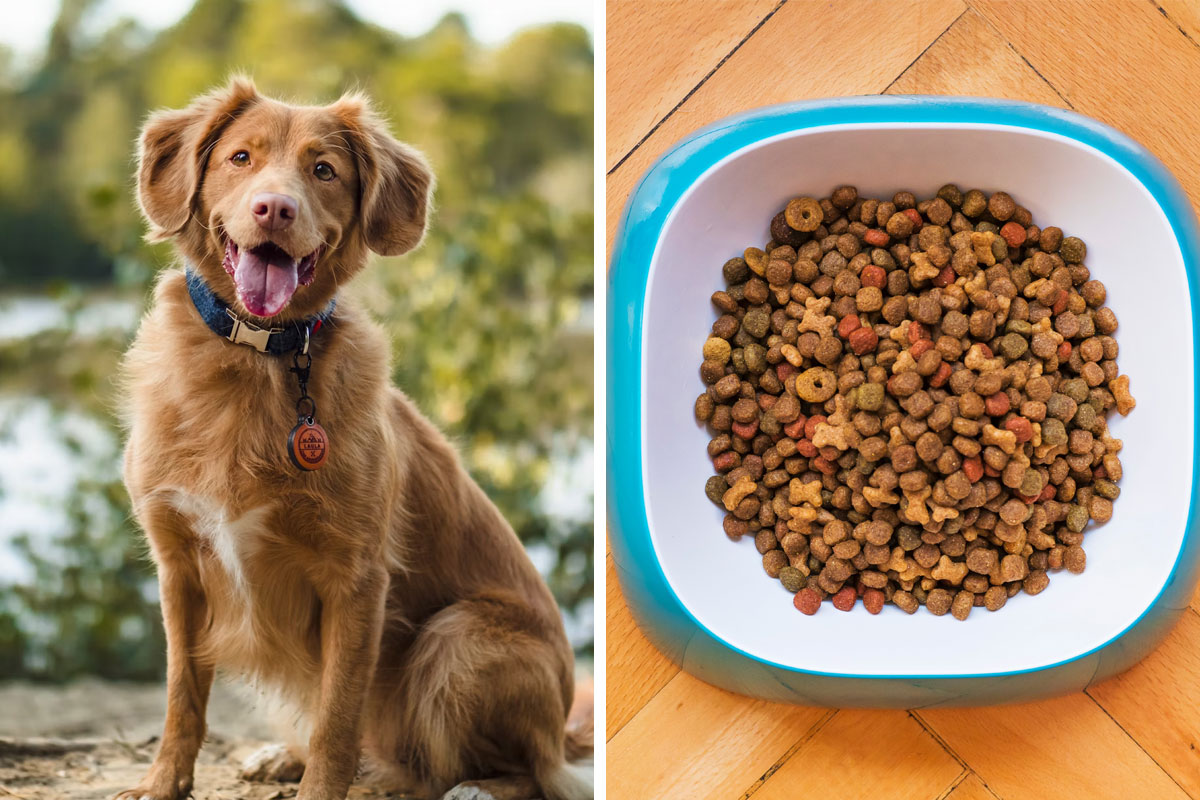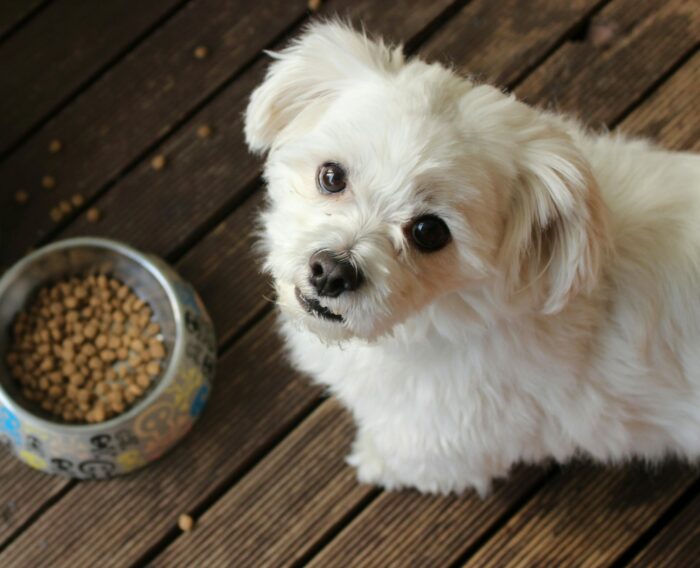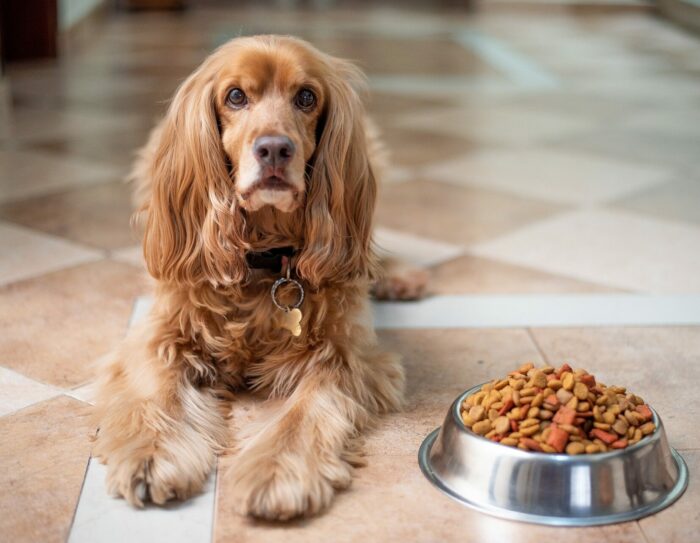
When To Switch From Puppy to Adult Dog Food for Optimal Feeding
Embarking on the journey of raising a pup is filled with numerous milestones, and one of the most crucial is transitioning from puppy to adult dog food. Do you know giving your dog the wrong food at the wrong time can cause big health problems? And this includes obesity and developmental problems. In fact, in 2022, about 59% of dogs in the U.S. are overweight or obese – which leads to a plethora of health problems like: arthritis, kidney disease, and even cancer.
- Proper food transition critical for a puppy's growth
- Transition age depends on breed size and activity level
- Switching process to adult food should take 10 days
- Meal frequency changes with adult dog food transition
This shows why it’s so important to feed your dog the right food at the right time. The key factors in this important transition include the size of your dog’s breed, how active they are & any special health needs they might have.
Keep reading to find out how to make this change in the best way, helping your dog stay healthy at every stage of their life.
The information provided herein is for informational purposes only. Please refer to our disclaimer for more details..
Difference Between Puppy Food and Adult Dog Food
Image credits: Ayla Verschueren
Knowing the difference between puppy and adult dog food is really important for your pet’s health. According to the Association of American Feed Control Officials (AAFCO) – puppy food is different from adult dog food in its nutritional composition, crucial for a puppy’s growth.
- Puppies should be fed puppy food that has a lot of protein (at least 22%), fat (8%), calcium (1%), phosphorus (0.8%), and sodium (0.3%). And these things help them grow well, including their muscles, bones, brain & eyes. Puppy food often has more omega-3 fatty acids, which are good for brain and eye development. And big puppies, like those who will grow into large dogs, need special food. Their food has less fat, calcium, and phosphorus to stop problems with their bones, like elbow and hip dysplasia, which can happen if they grow too fast.
- Adult dog food, on the other hand, has lower levels of these nutrients (18% protein, 5% fat, 0.6% calcium, 0.5% phosphorus, 0.06% sodium). And this is because it’s made to keep them healthy, not to help them grow.
Why Switching Food at the Right Time Essential
Switching your puppy to adult dog food at the right time is super important for their health. And if you change their food too late or too early, it can cause big health problems.
Consequences of Delayed Transition
If you wait too long to switch from puppy to adult food, your dog might get overweight. And this is because puppy food has more fats and calories. After all, it’s meant to help them grow quickly. If a puppy eats this kind of food for too long – they might gain too much weight. Moreover, certain breeds, if not switched to breed-specific adult formulas in time, can have joint problems. And, this is due to the accelerated growth induced by the high protein & calories in puppy food.
Risks of Premature Switching
On the other hand, switching to adult dog food too soon can be equally harmful. Puppies deprived of the essential nutrients found in puppy formulas might suffer from nutritional deficiencies & growth abnormalities. They might not reach their full size and could have more chances of having problems later on with their:
- Bones
- Joints
- Brain
- And eyes
Understanding and adhering to the correct timing for switching your dog’s food is therefore essential for their overall health and well-being.
When To Transition to Adult Dog Food
Image credits: M Burke
Changing your puppy to adult dog food is a big step. Knowing when to do it is key, and it depends on things like how big your dog’s breed is, how active they are & other things like if they’re spayed or neutered.
1. Breed Size Matters
The maturity rate of dogs varies significantly based on breed size – which directly influences when to transition to adult food:
- Small Dog Breeds (Under 25 pounds when grown): Small dogs like Chihuahuas, Yorkshire Terriers & Pugs grow up fast. Change them to adult food when they are about 9-10 months of age.
- Medium Breeds (25-50 pounds when grown): Breeds like English Springer Spaniels and Border Collies are grown up by 12-15 months. Switch to an adult when they reach this age.
- Large Breeds (Over 50 pounds when grown): Big breed dogs like Golden Retrievers and German Shepherds grow more slowly. So they should stay on puppy food until they are 14-24 months old.
- Mixed Breed and Unique Cases: If you have a mixed-breed dog or aren’t sure how big they’ll get, ask a veterinarian. They can give you tailored advice based on your dog’s growth like when you should start feeding your puppy an adult diet. And what kind of food can fulfill the nutritional needs of your dog, dry food or wet food.
2. Activity Level
Athletic dogs might benefit from staying on puppy food formulas longer. The extra protein & calories in puppy food help their muscles grow and give them energy for a lot of activity.
3. Spaying/Neutering Considerations
If a puppy is spayed or neutered before it’s almost fully grown – it might need 30% fewer calories. But this usually doesn’t slow down how fast they grow. And for big breeds, being spayed or neutered early might affect their bones & joints.
4. Monitoring Food Consumption
As puppies get close to being fully grown, the way they eat might change. And if they start leaving food in their bowl, it could mean it’s time to start changing their food. You can start by giving them a little less food at each meal and watching how they look and feel to make sure they’re eating the right amount.
How To Transition Your Puppy to Adult Dog Food Successfully
Image credits: Alkhaine
Transitioning your puppy to adult dog food is a delicate process that needs to be done gradually to avoid digestive issues. It can take 10 days to make the switch. Here’s a step-by-step guide for a smooth change:
- Days 1-2: Start by mixing a little adult food with their puppy food. Go for about 20% adult food & 80% puppy food, this slow start helps your puppy get used to the new food.
- Days 3-4: Increase the amount of adult food a bit more. Now, the mix should be 40% adult food and 60% puppy food. This gradual increase reduces the risk of gastrointestinal upset.
- Days 5-6: Continue adjusting the ratio. It should now be 60% adult food and 40% puppy food. Watch how your puppy is doing with the new food – making sure they’re okay.
- Days 7-9: Almost there! Change to 80% adult food and just 20% puppy food. And by this time, your puppy’s system should be more accustomed to adult food.
- Day 10: Complete the transition by switching entirely to 100% adult dog food and continue to feed them this.
Stop changing their food and talk to your veterinarian if at any point your puppy shows signs of discomfort, like:
- Vomiting
- Having diarrhea
- Or not eating
And remember, keeping the same feeding times during this change helps your puppy feel calm & makes switching their food easier.
Feeding Frequency for Your Dog
Changing your puppy to adult dog food isn’t just about the type of food. It also means changing how often they eat and how much they get. Here’s a guide to help with this change:
- Large-Breed Puppies: These puppies usually do well with three meals a day – even after switching to adult food. This helps in managing their larger portion sizes & supporting their substantial growth.
- Medium-Breed Puppies: When they start eating adult food, medium-sized breeds should eat twice a day. And, this fits with their moderate growth rate and dietary needs.
- Small-Breed Puppies: For small breeds, it’s a good idea to change from 3 meals to 2 meals a day after switching foods. This works well for their smaller stomachs and lower energy requirements.
If you need specific advice for your dog’s complete and balanced diet and eating schedule, it’s best to consult with your veterinarian or a dog nutrition expert. And they can provide tailored advice, ensuring your dog’s diet is perfectly suited to their unique needs and lifestyle.
Conclusion
As you navigate the journey of dog ownership, knowing when to change from puppy food to adult food is really important for your dog’s health & happiness. Choosing the right food for their size, how active they are, and other individual factors make sure they get the best nutrition as they grow. This change isn’t just about how old they are – it’s about helping them grow up healthy and strong. And by making smart choices about your dog’s food, you’re helping them have a better, healthier life. Feel good about this change, knowing you’re providing the best care for your loyal companion.
153views
Share on Facebook















-4
0